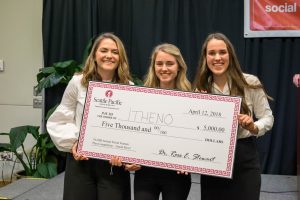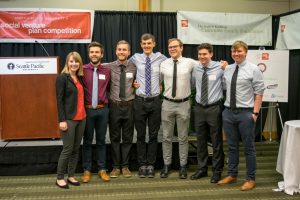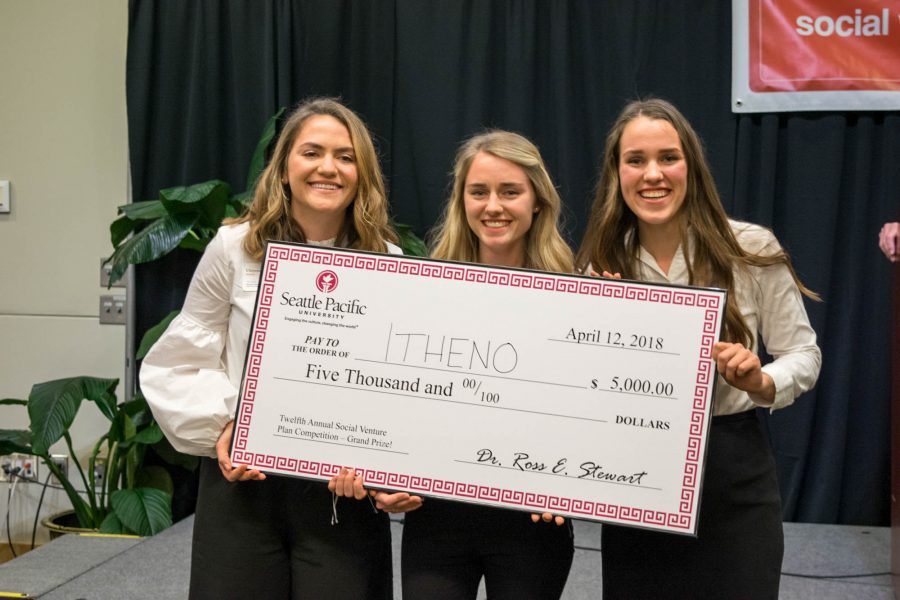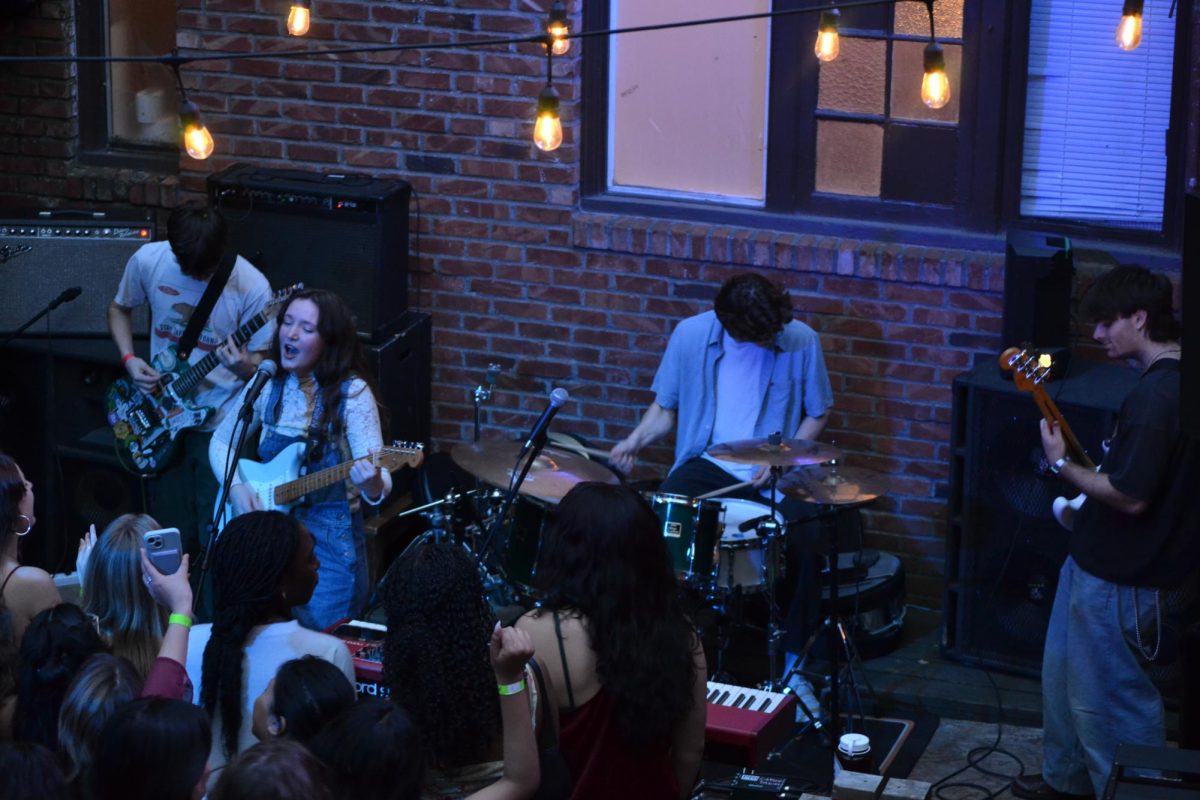Chatter fills the room, creating a thick and resounding blend of conversation as students present their final projects to judges. Students appear flushed, and nervous emotions take over. These projects are the result of seven months’ work, after all.

Despite their nerves, students stand with pride around their business model displays, and are eager to answer questions and impress the judges. They all hope that their hard work will result in the grand prize.
On Thursday, April 12, Seattle Pacific University’s School of Business, Government, and Economics held its twelfth annual Social Venture Plan competition. Presented in a trade show format, this competition gives students the opportunity to apply their knowledge in such a way that relates directly to their future careers, while simultaneously promoting societal well-being.
Preparing for the Social Venture Plan Competition is an extensive process. Students typically begin preparation in September.
The project aims to allow students to create a unique business model that can be brought to life and even continued after the competition.
In order to better equip participants for the competition, SPU encourages students to enroll in Social Venture classes.
As part of this development process, they meet with outside professionals related to their plan’s field of operation. These coaches will then give them advice on how they should present their projects.
Senior Rebekah Johansen explained that she was able to work directly with a coach from Microsoft. For Johansen, having the chance to work alongside someone with experience in a STEM company made the project all the more exciting.
Senior Bethanie Mazengia joined with Esaac Mazengia and Shah Yousuf, both first year students at the University of Washington, to bring awareness to the immense poverty gap between Rainier Valley and its surrounding neighborhoods through their business idea, “Chomp.”
Rainier Valley, a community about twenty minutes south of Queen Anne, has been declared one of the most diverse neighborhoods in the country.
Yousuf asked, “Why is it that this community is forgotten about? Why is it just this community that’s struggling so much? And nobody seems to care, you know?”
Chomp recognizes the income gap, and hopes to develop a system of inter-community exchanges as a solution. The company will do this by purchasing foods from affiliated ethnic restaurants and selling them in a food truck sent to various colleges and universities. Over 40 percent of their profits will then be invested back into the Rainier Valley Community.
This project proved very important to the group, as their passion was evident during their presentation. They presented a cultural display, wearing vibrant shirts and using drums as props.
Through the Social Venture Plan Competition’s partnership with Urban Impact, Chomp received a well-deserved $500 prize.
David McCordic, Jeffrey Peterson, Dan Houser, Natalie Holmstedt, Garrett Berkey, Tristan Sanders and Luke George presented their business, “Solairo,” a solar powered heating and air conditioning system designed to integrate with refugee tents and homes.
The group highlights the importance of thermal comfort, a factor that can affect both physical and mental health. Solairo also works to prevent the use of unhealthy and polluted heat sources, such as kerosene lamps.

“The average refugee from Syria spends seventeen years in a refugee camp that is built to last five years,” Holmstedt said.
Because five of the Solairo team members are mechanical engineering majors, they were able to incorporate the Social Venture Plan into their senior design project as well. Solairo won both the People’s Choice award, which included a prize of $1,000, and the second-place prize of $3,000.
Other groups focused their plans on the global oppression of women, seeking solutions through their business models.
One business model named, “Planting Change,” claims that if access to agriculture were made equally available to females, there would be a 12 percent decrease in world hunger.
Specifically focusing on Bihar, a state in East India, Planting Change hopes to reduce poverty by providing the sustainable resource training that women do not currently have access to.
Seniors Liz Heller and Nicole Bachaud have been working on this plan since September. As a global development major, Heller is excited about this project because she says it is a “practice run” for what she wants to do with her career.
“Dotted,” a plan designed by seniors Emma Wyma and Celene Haque, seeks to help girls obtain access to education in Bangladesh.
Both Wyma and Haque are aware of the immense issues surrounding women’s education rights, and they aspire to help.
Haque explains that through a customizable monthly subscription box, “Dotted promotes healthy sex, happy periods and accessible education.”
Fifty percent of their funds will go to non-governmental organizations in Bangladesh, who will then use these funds to help women find access to education in rural areas.
“I think our main driving idea was that there’s already existing great things — let’s connect them. So, we support 100 percent women-owned, vegan, all-natural products in a box, to then also fund other women,” Wyma said.
“Itheno,” a project designed to reduce carbon dioxide emissions in West Bengal, received the grand prize of $5,000. Through the creation of a mechanical and chemical process, Itheno converts rice stems into bioethanol fuel.
This process also generates a residue fertilizer that is high in nitrogen, potassium and phosphorus.
“Not only are we contributing to reducing CO2 emissions, we’re also providing a clean and accessible energy resource to rural farmers,” junior Cheyenne Thornton said.
Thornton intends to use her global development major to go into the expansion of sustainable agriculture.
Although the process was long and difficult at times, students echoed its reward. It was clear that each group had prepared well, and were able to present their projects with confidence before the judges.
Bond Aster, a small business coach and owner of Value Logic Solutions, explained that he looks for a product that can be used when making decisions as a judge.
He expects that the service or product be ready to sell, and that the students have thoroughly thought the process through. “I want to see that they’ve got something that works.”
Each group of students showed genuine interest and passion for their business models and the judges were inspired by the fresh ideas presented.
As a member of the winning group who created Itheno, Thornton shared her motivation for creating the project.
“I have a heart to see India develop both sustainably and economically. We just saw a great need in India for something like this.”

















































































